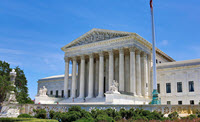The Supreme Court of the United States (SCOTUS) issued a landmark property rights decision on June 21, ruling that the federal courts are open to decide landowners' claims for a Fifth Amendment "taking" of property by local regulatory agencies.
 |
T he Supreme Court of the United States issued a landmark property rights decision on June 21, ruling that the federal courts are open to decide landowners' claims for a Fifth Amendment "taking" of property by local regulatory agencies. |
- In Knick v. Township of Scott , the nation's highest court reversed a 1985 precedent that had forced property owners to first bring takings lawsuits in state courts, which acted as "gatekeepers" to block the claims from ultimately getting to federal court.
- The 5-4 ruling in Knick holds that suits arising under the Takings Clause can be brought as an initial matter in U.S. trial courts, and then appealed as of right in U.S. circuit courts – just like any other alleged grievance to vindicate protections in the Constitution's Bill of Rights. Such matters are no longer relegated to state judges for resolution. Federal courts are now proper venues to test the constitutionality of aggressive land-use decisions by local regulators, and can decide whether landowners are owed "just compensation" for a property taking. (SCOTUSblog Opinion Analysis, June 22.)
- Chief Justice Roberts's majority opinion corrected the litigation dilemma for property owners trapped between the state and federal judiciaries. "The takings plaintiff thus finds himself in a Catch-22: He cannot go to federal court without going to state court first; but if he goes to state court and loses, his claim will be barred in federal court," Roberts wrote. "The federal claim dies aborning."
- Roberts added, "Takings claims against local governments should be handled the same as other claims under the Bill of Rights. We now conclude that the state litigation requirement imposes an unjustifiable burden on takings plaintiffs, conflicts with the rest of our takings jurisprudence, and must be overruled."
- In an amicus brief supporting the property owners, AARP advocated the "state court first" rule imposed "costly and needless litigation burdens" which "pose a threat to the economic security of older Americans of modest means especially, given their higher vulnerability to property tax foreclosure and lack of resources." (Forbes, June 22).
The attorney representing the property owners before SCOTUS remarked that Knick "reject[s] barriers that unfairly deny property owners their day in court [and] sends a message that property rights are just as sacred as all other rights." (Pacific Legal Foundation, June 21.)
